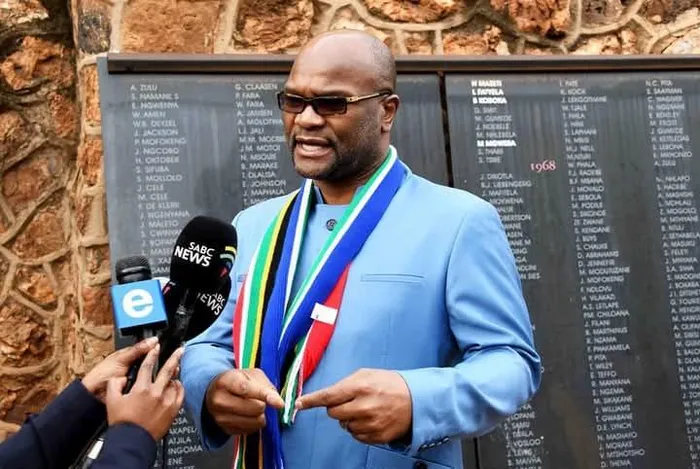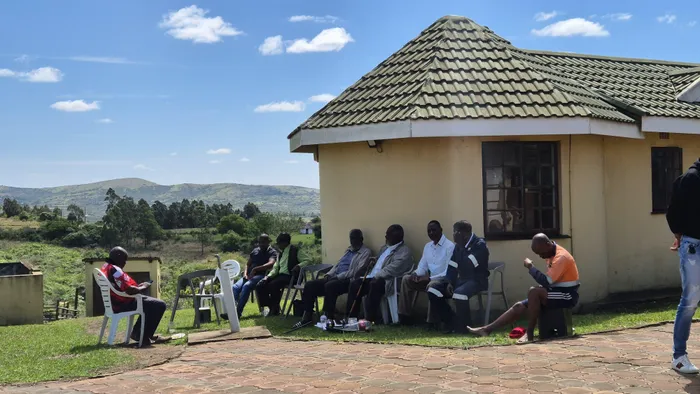
The family of South Africa's ambassador to France, Nathi Mthethwa have called for a thorough investigation into his death.
Image: Facebook
The family of the South African Ambassador to France, Nathi Mthethwa, who died after falling from the 22nd floor of a Paris hotel on Tuesday, are seeking answers after his death.
The family have steadfastly rejected a claim that Mthethwa would have committed suicide.
The death of the 58-year-old former Police and Sports, Arts and Culture minister at the Hyatt Hotel in Porte Maillot in Paris came after he was reported missing on Monday.
The family said Mthethwa had been through torture at the hands of the apartheid regime and would not take his own life to avoid accountability for his alleged interference in the work of the police as revealed in the Madlanga Commission of Inquiry.
They have called for a full investigation by French police and South Africa’s Department of International Relations and Co-operation into the circumstances leading to his death.
Speaking to the media at the Mthethwa home in KwaMbonambi, outside Empangeni in KwaZulu-Natal, his relative Khulekani Mthethwa said the family was not buying the reports of a potential suicide, saying there were mysterious circumstances leading to the ambassador’s death.
Khulekani said the family wanted to know where Mthethwa’s security detail was from the time he was missing until his death.
He said that Mthethwa was a brave man who “endured torture and all forms of brutality at the hands of the apartheid police; therefore, there was no way that he would have taken his own life”.
“My brother would not have feared appearing in front of the Madlanga Commission to answer for any allegations against him. He was not a coward; as the family, we dismiss any suggestion that he took his life to avoid going to the Commission. All we are calling for is a thorough investigation of the mysterious circumstances around his death, especially as he had security,” said Khulekani.
As condolences for the former ambassador continued to trickle in yesterday, KZN ANC leaders recalled Mthethwa’s role when he led the charge by the ANC Youth League that saved former president Jacob Zuma’s political career.
Mthethwa, carrying the mandate of the ANCYL, shot down attempts by Zuma to withdraw from party activities after he had been implicated in allegations of corruption in 2005.
The Mercury understands that Mthethwa first raised the issue of Zuma’s withdrawal during the plenary sessions of the party’s National General Council (NGC) and highlighted the negative impact it would have.
The Mercury spoke to two senior leaders of the party who had worked with Mthethwa dating back to his time in the youth league.

Neighbours at the Empangeni home of Nathi Mthethwa, South Africa's Ambassador to France.
Image: Sibonelo Ngcobo/ Independent Newspapers
They spoke of his character and leadership abilities, particularly during that moment in the NGC. In 2005, Mthethwa spoke up in the ANC NGC meeting and announced that the ANCYL was rejecting a decision by Zuma to withdraw as a leader of the party due to the sentencing of his former financial advisor, Schabir Shaik, to 15 years for corruption.
ANC leader in KwaZulu-Natal, Nhlakanipho Ntombela, who was in the Youth League at the time, described this as a defining moment of the NGC, which launched Zuma’s political revival that culminated in him being elected the ANC President at the Polokwane Conference in 2007.
Speaking about that moment at the NGC, Ntombela emphasised the importance of contextualising it within Mthethwa’s long history of struggle, which dates back nearly 40 years. He noted that Mthethwa had grown in the struggle, being part of youth organisations in the Klaarwater (Durban) area.
“In the NGC, Mthethwa was carrying the mandate of the Youth League, which had resolved to support Zuma,” Ntombela continued.
He explained that prior to the start of the NGC, the then-embattled Zuma had indicated his intention to withdraw from party activities to focus on dealing with the allegations against him.
“Zuma had informed the top leadership of the party that because of the allegations he was facing, he was withdrawing from party activities. The party leadership had accepted this.
“Mthethwa, carrying the mandate of the Youth League, stated that the Youth League was rejecting this. That moment changed the mood of the NGC. At the time, the divisions in the ANC were apparent and could no longer be hidden. The NGC was not a platform to discuss leadership and elective issues but rather a political progress platform to assess where the party stood.” Ntombela said.
“That moment became a platform that launched Zuma’s campaign and his eventual election in 2007 as the ANC president, and Mthethwa was elected to the NEC of the ANC,” Ntombela added.
Deputy Minister of Public Works and Infrastructure Sihle Zikalala noted that it was Mthethwa who had raised the issue of Zuma’s state in the party during the plenary at the NGC. The matter was then debated by all the parties present.
“Zuma was not out, but he was in what we could call a ‘step aside’ position due to the challenges he was facing. The feeling was that this was not good,” he said.
He described Mthethwa as a principled leader who worked within the collective of the ANC and never sought personal glory.